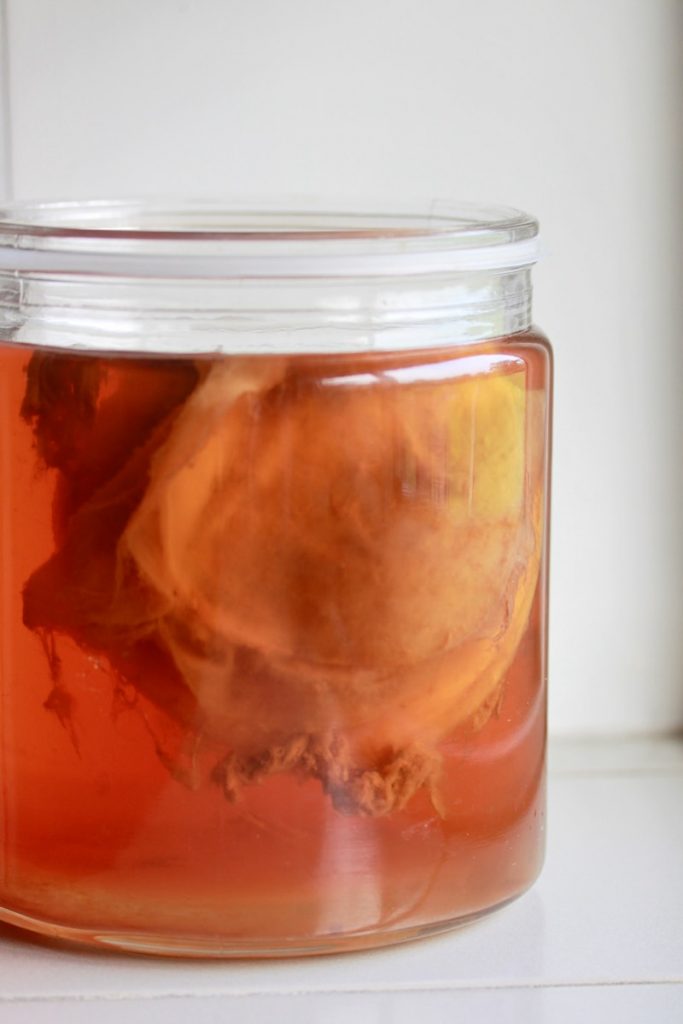Kombucha, a probiotic-rich fermented tea, has become increasingly popular among health enthusiasts. One question that often arises is, “how much caffeine is in kombucha?” This question is particularly relevant for individuals who are sensitive to caffeine or trying to limit their intake. In this in-depth guide, we will explore the process of kombucha production, its caffeine content, and ways to control the caffeine levels in homemade kombucha.
What is Kombucha?
Kombucha is a fermented drink traditionally made from sweetened tea and a specific culture known as SCOBY (Symbiotic Culture Of Bacteria and Yeast). The SCOBY metabolizes the sugar in the tea, resulting in a fizzy, tangy beverage rich in probiotics and healthy acids. Although kombucha has been consumed for centuries, it has recently gained popularity due to its potential health benefits, including improved digestion and enhanced immune function.
Does Kombucha Contain Caffeine?
The short answer is yes, kombucha does contain caffeine. The caffeine content in kombucha primarily depends on the type of tea used during the brewing process. As the main ingredient in kombucha is tea, which naturally contains caffeine, it is expected that kombucha will have some caffeine content. However, the fermentation process reduces the caffeine content, making it significantly lower than the original tea used.
Estimation of Caffeine Content in Kombucha
Caffeine content in tea can vary widely, depending on factors such as the type of tea, the steeping duration, and the temperature of the water used. On average, an 8-ounce cup of tea contains about 30-50 milligrams of caffeine. In comparison, kombucha typically contains about one-third of the caffeine content of the original tea, which equates to approximately 10-15 milligrams per 8-ounce serving. However, these are general estimates, and the actual caffeine content can vary depending on the specific brewing process used.
Factors Influencing Caffeine Content in Kombucha
Several factors can influence the caffeine content in kombucha. These include:
- Type of Tea: The type of tea used to brew kombucha can significantly impact its caffeine content. Black tea tends to have the highest caffeine content, followed by oolong tea, green tea, and white tea.
- Steeping Time: The length of time the tea is steeped will affect the amount of caffeine extracted from the tea leaves. The longer the tea is steeped, the more caffeine will be released.
- Fermentation Duration: During the fermentation process, the bacteria and yeast in the SCOBY consume some of the caffeine, reducing its content. Therefore, the longer the fermentation, the less caffeine the final product will have.
- Additional Ingredients: Some kombucha flavors may contain additional ingredients that naturally contain caffeine. For example, a kombucha flavored with cacao or coffee will have a higher caffeine content than a plain kombucha.
Caffeine Content in Commercial Kombucha Brands
Most commercial kombucha brands do not provide specific caffeine content information on their labels, which can make it challenging for consumers to determine the exact amount. However, some brands do share this information:
- Health-Ade Kombucha: It contains between 8 to 15 milligrams of caffeine per serving, depending on the flavor.
- KeVita Masterbrew Kombucha: This brand is known for its high caffeine content, averaging around 68 milligrams per 15.2-ounce serving.
- Rise Kombucha: Rise Kombucha uses a unique fermentation process that results in low levels of caffeine, ranging from 8 to 15 milligrams per serving.
- GT’s Kombucha: Each serving of GT’s Kombucha contains between 4 to 8 milligrams of caffeine. However, their Coffee Kombucha contains a significantly higher amount, approximately 40 milligrams of caffeine per serving.
Tips for Reducing Caffeine Content in Homemade Kombucha
If you are sensitive to caffeine or trying to limit your intake, there are several ways you can reduce the caffeine content in your homemade kombucha:
- Use Lower-Caffeinated Teas: Opt for teas with naturally low caffeine content, such as green or white tea.
- Shorten Steeping Time: Reducing the time you steep your tea can result in less caffeine being extracted.
- Use Decaffeinated Tea: Decaffeinated tea can be used as the base for kombucha, although this may affect the fermentation process.
- Allow Longer Fermentation: Allowing your kombucha to ferment for a longer period can help reduce its caffeine content, as the SCOBY will consume more caffeine.
In conclusion, while kombucha does contain caffeine, the amount is significantly lower than that in regular tea or coffee. This makes kombucha a suitable choice for those looking for a healthful drink with a slight energy boost without the intense jolt associated with high-caffeine beverages.







